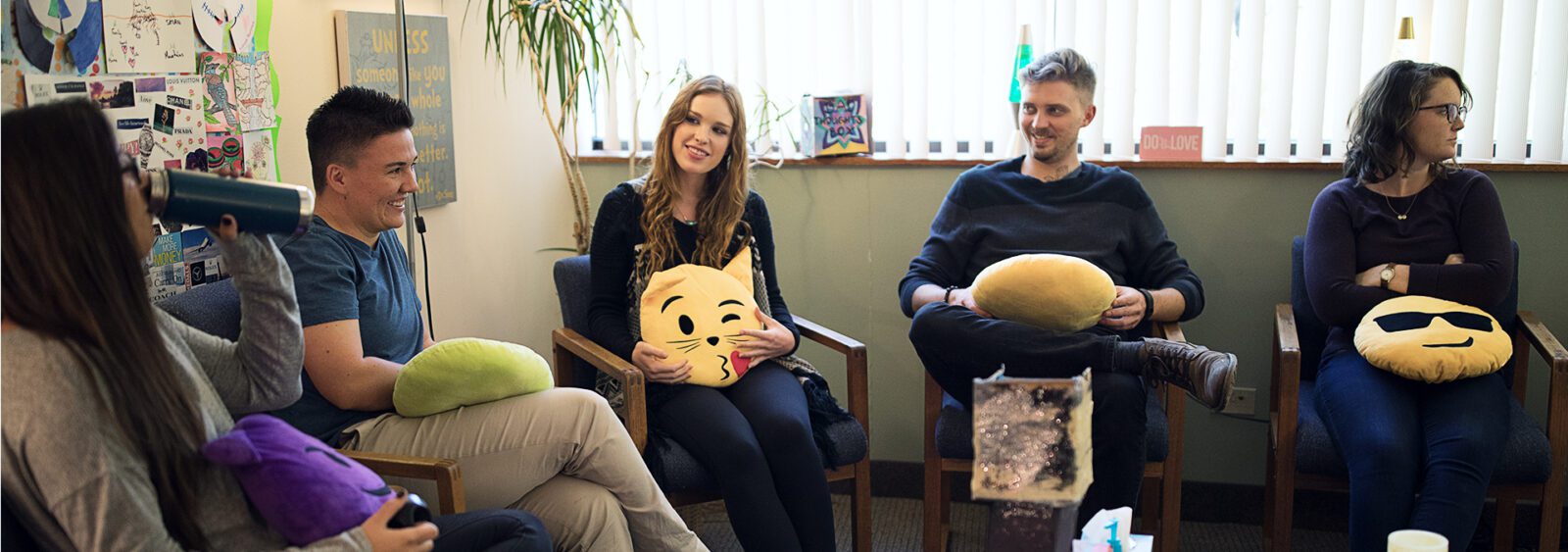You’ve finished a residential treatment program or inpatient rehab—congratulations! This takes a lot of hard work and commitment. There were probably several times that you didn’t think you would finish, or that it was hard to imagine being successful.
The first step is often the hardest, and you’ve started.
Now is the time to kick back, relax, and get back to life as you knew it, right? Wrong! As important as this first step of intensive treatment is, it is just the beginning of your recovery journey.
You wouldn’t train for a marathon and assume that you’ll be in great shape forever; recovery is the same. It’s an ongoing effort and a way of life that you recommit to each day.
Studies show that the longer people stay engaged with some level of ongoing or continuing care (often called aftercare or relapse prevention) the more likely they are to achieve positive results in their recovery. So what does this look like exactly?
What is a relapse prevention group?
Relapse prevention is a broad term that could include a structured outpatient group that meets weekly, a 12-Step based group, or a CBT group. Generally, it is any group that follows a more intensive period of treatment and helps people stay focused on their recovery goals.
Why is relapse prevention important?
Intensive programs are relatively brief.
Most inpatient rehabs don’t last more than a month, and even Intensive Outpatient Programs (IOP) rarely last more than 3 months. While this can seem like a long time, in the grand scheme of recovery, it is a very short time.
If someone has been using substances for 6 years, think how short a month is by comparison. For change to truly become second nature, it is important to be actively working to sustain it for an extended period of time.
There will be highs and lows in any treatment journey.
Many people feel elated when they first become sober, reveling in the positive feedback from friends and family, newfound energy and clarity. They can’t imagine ever going back to use.
In the 12-Step tradition, this is often referred to as “the pink cloud.” In this state of mind, continuing care or relapse prevention can seem unnecessary. However, almost inevitably, the pink cloud wears off as life presents challenges.
Perhaps a girlfriend breaks up with you, a parent gets sick, or you lose your job. Even times of “positive” transition, such as starting college or having a baby, can leave someone susceptible to a lapse.
We know both anecdotally and through research that having a consistent and long-term recovery program helps people successfully navigate the ups and downs of life without using. Sometimes people reason, “if things get tough then I’ll seek out help.”
However, at times like these it’s important to already have a support system in place – you don’t want to have to meet new people, learn group norms, and deal with initial awkwardness when you most need help – you want to know what to expect and to already have people and systems you can count on.
Why does relapse prevention work?
Community
While it can be difficult to quantify the effects of feeling like part of a community, this aspect of relapse prevention is incredibly important. Humans are hard-wired to be social beings and to depend on others for connection, comfort, and safety. Just as our ancestors understood that a person alone would not survive for long, emotionally, we are no different today.
Sure, you may not be eaten by a saber-tooth tiger if you aren’t in a community, but your attachment system will be in “distress mode.” For some people this longing is very obvious, for others it tends to get buried and may be covered up with drugs and alcohol, or working long hours.
However, this need for connection is universal. Even if a relapse prevention group never discussed drugs and alcohol or recovery strategies, just showing up each week with a group of people who care about you and your recovery helps you stay on track.
Accountability
A community is not just about support, but also accountability. We all need people in our lives who, when we think it’s a good idea to get back together with our ex, remind us that the last time we ended up in our pajamas eating ice cream and chain-smoking cigarettes for a week.
It’s the nature of our memory to minimize negative consequences and look back fondly on the good. This is true in love, childbirth, and substance use. Having people to check your thinking, remind you of your priorities, and let you know when they think you’re making a mistake is crucial.
A relapse prevention group that includes people who have seen you at your best and your worst is an invaluable asset in recovery.
Consistency
Having a consistent time built into your weekly schedule to focus on recovery makes things simple. Order and routine are often an undervalued aspect of the treatment experience but are a very important part of what helps many people to feel successful and regulated, in contrast to the chaos of addiction.
It’s important to find ways to maintain a level of structure and consistency even after the most intensive part of treatment is over.
Problem-solving and skill building
Cognitive Behavioral Therapy (CBT) is included in some way in most treatment programs and evidence-based relapse prevention groups. This means it isn’t just about community and support but also staying sharp in the kind of problem-solving and thinking that is recovery-oriented.
This includes identifying high-risk situations and people, exploring alternate behaviors, and recognizing thought patterns that lead to substance abuse. While this will become second nature over time, particularly in the first year of recovery it is a good idea to be actively practicing these skills.
Building “muscle memory” and habit
You have probably heard that it takes a certain amount of time for something to become a habit. You may have heard 21 days, 28 days, or 90 days. In reality, there isn’t one definitive timeline by which a new behavior becomes second nature – there are a lot of factors that go into this calculation.
However, the truth behind this folk wisdom is that the longer you do something consistently, the more natural and second nature it becomes. Taking part in a relapse prevention group or otherwise being involved in a continuing care program is one way to help build up the “muscle memory” of sobriety.
How long should I stay in relapse prevention/continuing care?
While there is no magic formula for recovery, research suggests that staying in some form of continuing care or relapse prevention group for at least a year is a good idea. Continuing care should adjust based on your need and preferences, but maintaining some contact and consistency over time is best.
Of course, the reality is that recovery is a life-long endeavor, so even if you don’t go to the relapse prevention group associated with your primary care provider after a year, most people find it helpful to become involved in a long-term recovery community such as a Twelve Step Fellowship, LifeRing, or a community like Phoenix Multisport.
Relapse Prevention Groups & Aftercare in Colorado & Maryland
Sandstone Care offers a continuum of care to meet people wherever they are on their recovery journey. Besides offering medical detox, teen residential, extended residential care, Day Treatment, Intensive Outpatient treatment programs and therapeutic sober living, we also offer an ongoing outpatient program that meets weekly and is analogous to what many programs would call a relapse prevention group.
This group is for clients who have completed the higher levels of care and want to stay connected to their Sandstone Care community, as well as for those who may have done treatment elsewhere but are now focused on their recovery and appropriate for the outpatient level of care.
Call us today at (888) 850-1890 to see if our Colorado, Virginia, Maryland, or Illinois relapse prevention groups are right for you.
Other Relapse Prevention and Continuing Care Resources:
The Continuum of Care
Care for wherever you are in your journey.
Access a full range of treatments for mental health and substance use disorders. Whether you need a safe transitional living program, inpatient care, or outpatient treatment, we have a program to help.
Relapse Prevention and Continuing Care FAQs
Congratulations! We love to hear stories of people who have had transformative experiences in their IOP or inpatient programs. It sounds like you have discovered some pretty compelling reasons to stay sober, and some great skills to do so.
We still can’t recommend enough that you get involved with some sort of relapse prevention program or continuing care. Recovery is a marathon, not a sprint, and even the best of us experience ups and downs on the journey. Having support systems in place before the lows hit is key.
There is a range of relapse prevention groups out there, but most should be focused on recovery, not using. If you go to a relapse prevention group led by a clinical professional, it is more likely to use evidence-based practices to help you maintain sobriety and to have at least a semi-structured format.
Sandstone Care’s outpatient program is run by a licensed clinical professional.
Whether or not random or regular drug testing is part of a relapse prevention group varies depending on the group. Sandstone Care utilizes point of care drug tests and sometimes lab confirmations as one way of keeping participants accountable.
While at this point in the recovery process group members are primarily holding themselves and each other accountable for their sobriety, knowing that they may be tested at the group is one more encouragement to group members to stick to their recovery plan.
It also helps ensure that members of the group are at the appropriate level of care and that lapses are addressed in a timely and compassionate manner.
Yes, our outpatient program is open to more than just clients who have completed other parts of extended care with Sandstone Care. However, we want to make sure that you are a good fit for the outpatient program, and it is a good fit for you.
Our assessment process will help confirm that this is the appropriate level of care, and if it isn’t we’ll help you find a program that fits your needs.
How awesome that you are ready to make a change! Sandstone Care’s relapse prevention group is specifically geared toward adolescents and young adults who have some sobriety under their belt, and have developed some insight around their use and how to manage it, so it may not be right for you at this point in your journey.
However, when there is sufficient interest, Sandstone also offers an outpatient group for those who are just beginning their recovery and exploring their options. Call today to see if we are currently offering an outpatient group for those contemplating recovery.
We know that an IOP program can seem like a big commitment, but in our experience, it is helpful to kick-start your recovery with a more intensive program before tapering down. If you’re still not sure, give us a call at (888) 850-1890 and we can help explore what options in our continuum of care might be right for you.
Sandstone Care’s outpatient program offers a group for adolescents and young adults, as well as a separate group for parents. Facilitated by a mental health professional, this groups offers parents a place to get support, advice, and to attend to their own journey of recovery and wellness. Our entire continuum of care is focused on treating the whole family, and our outpatient program is no different.






